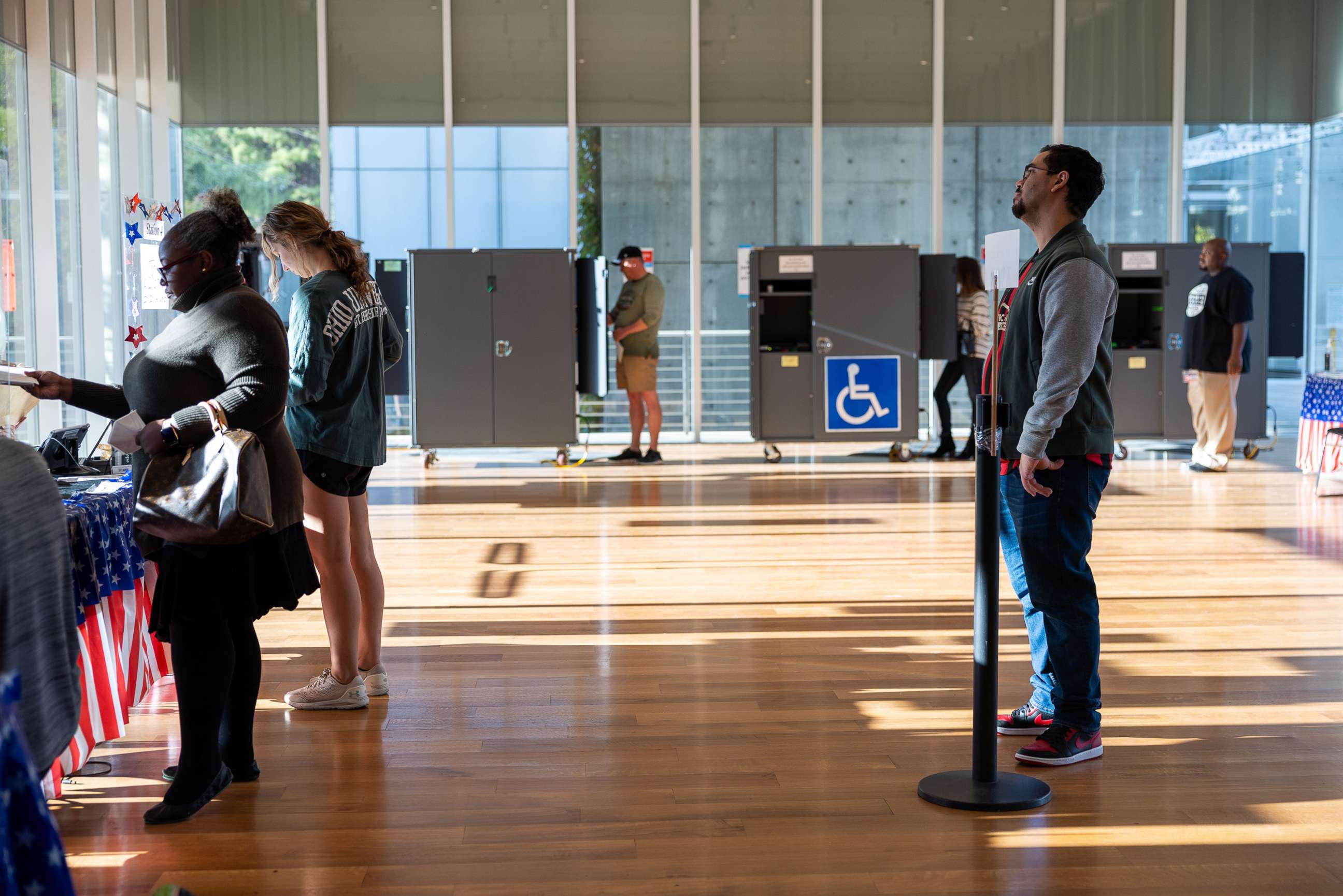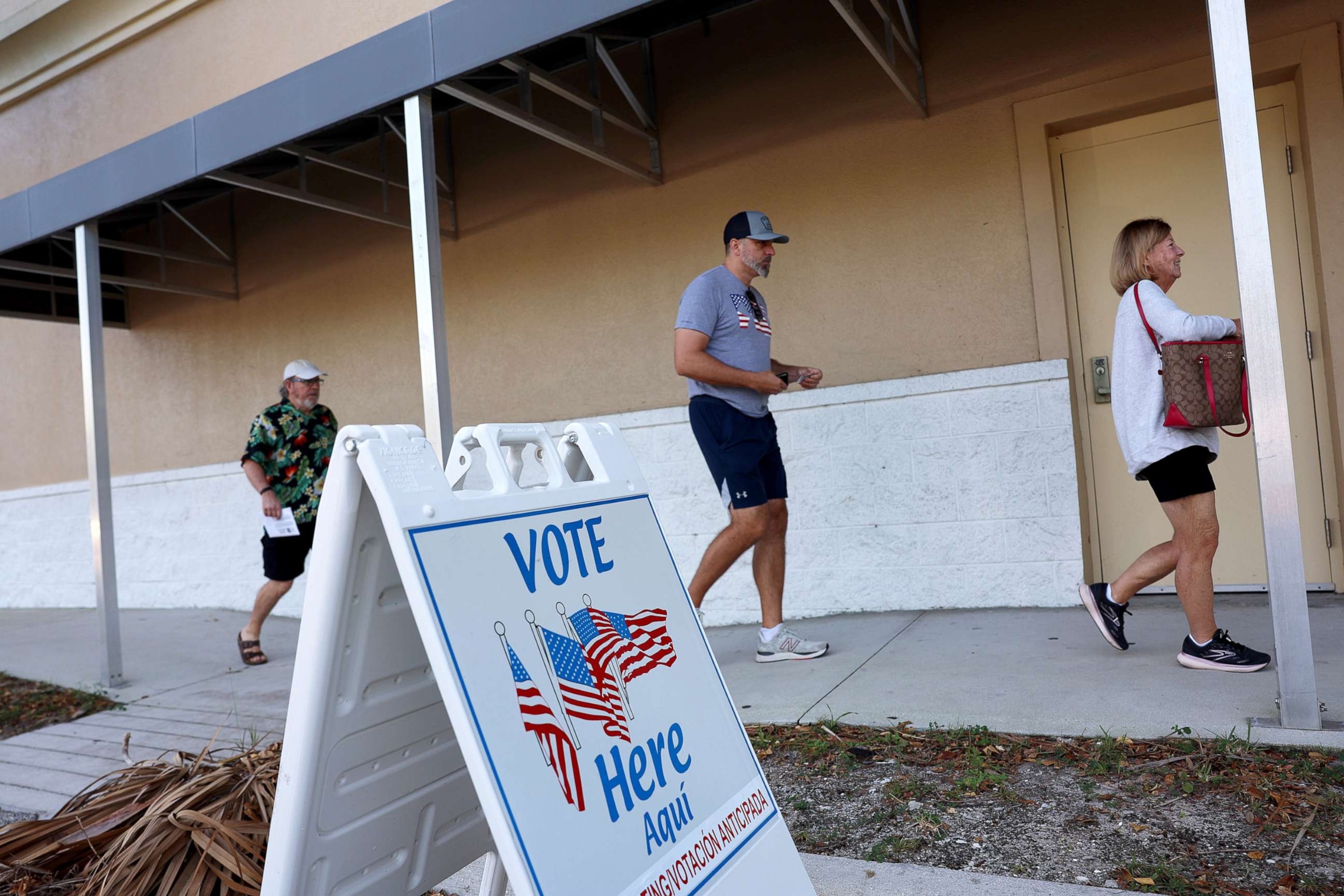Midterm elections early voting updates: Turnout surpasses prior years
As of Monday morning, more than 40 million votes had been tallied.
More than 40.7 million people have voted early in the 2022 general election, according to data analyzed by the University of Florida's U.S. Elections Project, with one day left until general election voting begins.
As of Monday morning, the project counted 40,790,469 early votes, of which 22,263,979 were mail-in ballots returned and 18,526,490 ballots cast in person so far. That's over five million more votes than had been cast on Friday, when 20,226,492 early votes had been cast.

A number of states have opened up early voting within the past week, according to University of Florida professor Michael McDonald, who heads the U.S. Elections Project. That has led to the sharp uptick in early vote totals, along with historical evidence that voters tend to cast their ballots closer to Election Day.
Turnout in 2022 is still on track to be high for a midterm election, according to McDonald, even though midterms traditionally have lower participation compared to presidential cycles despite growing interest in recent years. The last midterm election, in 2018, recorded some of the highest turnout in the nation's history. In this election, some states like Georgia are seeing early vote numbers surge, suggesting they might break 2018 records. In other states, like California, McDonald noted that early vote tallies indicate overall turnout may not reach 2018 levels of high participation.
"It could be uneven," McDonald told ABC News. "We'll see high turnout, maybe exceeding 2018 In some states. And we may see lower turnout."
"I'm getting becoming a little skeptical seeing these numbers come in from some of these states like California."
McDonald noted that Democratic engagement is up in marquee races across the country, but less so in sleepier congressional or state legislative races.
"What we see in these competitive states are the Democrats are returning their ballots at a greater rate than Republicans," McDonald said. "But if you look nationally, and you look at some of the states where there's not these, these hot races are not happening -- places like Florida, or California -- Democrats actually have a lower mail ballot return rate in those states."
Of the states that record party registration, the U.S. Elections Project shows more Democrats have voted early this cycle -- 43% compared to 34% of Republicans, though Republican totals have creeped up over the past week while Democrats' have decreased.
The share of Republicans who are recorded saying voters should be allowed to vote early or absentee without a documented reason fell drastically in the past few years, according to a 2021 Pew Research survey– down 19% from 2018. The same survey found that Democrats were more than twice as likely as Republicans to strongly support making early, in-person voting available to voters for at least two weeks prior to Election Day.
The use of absentee and mail-in ballots have been subject to conspiracy and skepticism after former President Donald Trump said that mail-in ballots lead to voter fraud in 2020.
With the general election now only one day away, some sort of early voting option is underway in all states that allow it. Early voting periods range in length from four days to 45 days before Election Day, according to the National Conference of State Legislatures.
Georgia, in its first general election test of a sweeping elections bill signed into law in 2021 by incumbent Republican Gov. Brian Kemp -- legislation that Democrats widely deemed as restrictive -- has been shattering past turnout trends.
Georgia has had record early voting turnout since the option to cast a ballot opened last Oct. 17, surging to nearly twice the number on the first day of early voting in 2018, according to the secretary state's website. On Friday, they set all-time early vote records for a midterm election in the state, passing 2.5 million ballots cast.
"Georgia voters came out in near Presidential-level numbers," said Secretary of State Brad Raffensperger. "County election directors handled that demand with the utmost professionalism. They navigated a whole host of challenges and executed seamlessly. They deserve our highest praise."

But McDonald said that he's noticed in Georgia's data that while in-person early voting is up, the state is running at about half the volume that they did in the 2018 for mail-in ballot returns.
"That's to be expected, because Georgia made it much more difficult to request a mail ballot," he said. "It's not surprising that to see half the mail ballot usage that you saw in 2018. Just because you're having a high turnout midterm election, doesn't necessarily mean that there aren't some people who've been left behind who wanted to participate but unable to do so."
In Florida, in-person early voting began a week ago on Monday in 37 Florida counties. Voting trends in the Sunshine State have also been unusual, according to McDonald, with fewer registered Democrats who have voted than registered Republicans.
"Usually you see more Democrats voting than Republicans," he said. "A lot of Democrats have mail ballots, and they may yet return them. But at this point in time Republicans have a lead and in the early vote, and unless something fundamentally changes in Florida, if we go into Election Day and Republicans are still leading in the early votes, I would say that is all but over for [Charlie] Crist and [Val] Demings."
Florida has already seen some of the highest numbers of the cycle, mostly leading the nation in early vote totals. The state is currently totaling at 4,788,018 cast thus far, the second highest rates in the nation.
But Texas, which also started early voting last Monday, quickly shot up in ballots cast. The Lone Star State currently now leads the country in early voting, with 5,490,654 ballots returned.
Texas traditionally sees a lot of in-person early voting, McDonald notes. "In fact, in 2020, more people had voted in person early in Texas and had voted in 2016 election."
California has remained competitive in early voting as well, currently at 4,338,841 ballots returned, though not as competitive as years past.
McDonald has said that because of Florida, Texas and California's larger size, broader voter turnout activity is expected, along with the fact that Floridians tend to use mail ballots more frequently than some of the other states have so far been casting votes early.




